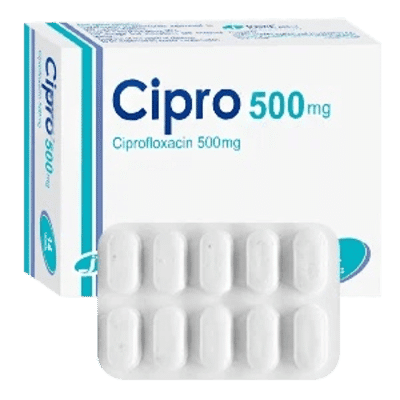I took Cipro to treat a urinary tract infection. Within a few days, I felt significant relief, and the symptoms began to subside. The medication was very effective, although I did experience a slight headache. This didnt detract from my experience with the drug.

Cipro
- Quality products
- Support 24/7
- Fast delivery
About this medicine
Cipro, also known as Ciprofloxacin, is an antibiotic from the fluoroquinolone class. Its primary function is to kill or slow the growth of bacteria. This drug is widely used to treat a variety of infections, including urinary, respiratory, skin, gastrointestinal, and bone infections. Its worth noting that Cipro is not effective against viral infections such as the common cold or flu. It is effective against serious bacterial infections, making it a powerful tool in doctors arsenals for treating these conditions.
Composition of the medicine
The main components of Cipro are specific substances that provide its antibiotic properties. This medication primarily consists of:
- Ciprofloxacin hydrochloride – the main active ingredient responsible for the medications antimicrobial action.
- Microcrystalline cellulose – used in the formulation to ensure stability and ease of manufacture.
- Sodium croscarmellose – a substance that promotes tablet disintegration after swallowing.
- Magnesium stearate – used as a lubricant in tablet production.
These elements, taken together, promote effective absorption and action of the medication in the body. Together, they ensure not only the therapeutic effect but also the stability of the dosage form.
Usage and dosage
To use Cipro correctly, you must follow certain recommendations. First, take the medication orally with a full glass of water. It is important to strictly adhere to the indicated intervals between doses, without skipping or doubling doses.
- Take the medication with food or on an empty stomach, and avoid taking it with dairy products.
- If you miss a dose, take it as soon as possible, but not if its almost time for your next dose.
- Its important to complete the full course of treatment, even if you feel better long before its finished.
Following these recommendations will help maximize treatment effectiveness and prevent the development of bacterial resistance to this antibiotic.
How does this medicine work?
Cipros mechanism of action lies in its ability to target specific bacterial enzymes, thereby disrupting bacterial DNA replication and inhibiting bacterial growth and reproduction. This property makes it particularly effective against a wide range of bacterial infections.
Due to its rapid penetration into bacterial cells, Cipro rapidly reaches therapeutic concentrations, allowing for rapid relief of the patients condition. This important advantage ensures rapid action and promotes rapid patient recovery, alleviating symptoms and eliminating the infection.
It is interesting to note that antibiotics in this group, including Cipro, do not affect viruses, making them a safe choice for treating bacterial, but not viral, infections.
Indications for use
Cipro is indicated for use in a variety of bacterial infections affecting various body systems. Its uses include:
- Treatment of urinary tract infections for rapid symptomatic relief.
- Bronchopulmonary infections, including acute bacterial sinusitis and infectious bronchitis.
- Skin infections, where protection against secondary infection is important.
- Treatment of gastrointestinal infections, such as salmonellosis.
- Treatment of infectious bone and joint diseases, which can prevent long-term disability.
Cipro should be prescribed by a qualified physician based on clinical examination and diagnostic evaluation.
Contraindications for use
However, like any medication, Cipro has a number of contraindications that should be considered before prescribing. This antibiotic is not recommended in the following cases:
- Having an allergic reaction to Ciprofloxacin or other components of the drug.
- Patients with known hypersensitivity to other quinolone antibiotics.
- Patients with severe kidney and liver disease, as this may increase the burden on the body.
- Pregnant and lactating women, due to a lack of safety studies for these groups.
- Patients with known joint problems, especially in children and adolescents.
These precautions help prevent potential complications and ensure the safe and effective use of the antibiotic.
Side effects
When using Cipro, you should also be aware of potential side effects. Although the vast majority of patients tolerate the drug well, some adverse reactions may occur:
- Gastrointestinal disturbances such as nausea, diarrhea, and vomiting.
- Dizziness and headaches, which may temporarily impair concentration.
- Rash or itching, which may indicate an allergic reaction to the drug.
- Tendon problems, especially in people over 60 or taking steroids.
- Sun sensitivity, requiring the use of sunscreen.
The presence of these side effects should be discussed with a doctor so that the dosage can be adjusted or the medication can be changed if necessary.
Frequently asked questions
Cipro Reviews and Experiences
A couple of months ago, I treated a skin infection with Cipro. The results were positive, and the inflammation subsided quite quickly. However, sometimes after taking the medication, I felt dizzy. This didnt interfere with my daily life, but I had to be careful when driving.
I recently used Cipro to treat a gastrointestinal infection. It showed excellent results, and the symptoms disappeared within a few days. I did have some nausea, but the improvement was worth the minor inconvenience.








